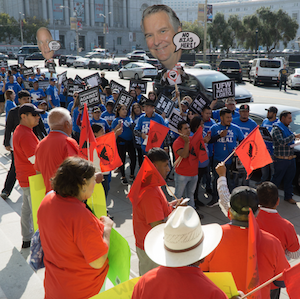More than 2 Years Later: Gerawan Workers are Still Fighting

The ALRB has refused to count their votes
By Olivia Grady
On September 5, 2017, hundreds of Gerawan farmworkers protested in front of the California Supreme Court in San Francisco. Pick Justice, a group of citizens concerned about the rights of workers, organized the rally for 9am.
The rally coincided with the Supreme Court’s hearing over whether the United Farm Workers (UFW) can invoke Mandatory Mediation and Conciliation in their attempt to unionize farmworkers. The 2002 amendment to the Agricultural Labor Relations Act forces parties to mediate in cases where they haven’t been able to reach a collective bargaining agreement. In other words, the state agency imposes a union contract on the workers without their vote.
The battle between the farmers and the union started in 1990 when the UFW won an election. However, the UFW never signed a contract with the company, Gerawan Farming, a fruit grower in the Fresno, California area that employs over 5,000 workers.
Then many years later, in 2012, after no communication with Gerawan, the union asked for information about the employees and requested negotiations. In 2013, the union demanded 3 percent of the salaries of these farmers, even though less than 1 percent of these workers worked for the company during the initial election.
Those who didn’t pay would be fired.
In March 2013, after ten bargaining sessions, the UFW invoked Mandatory Mediation and Conciliation (MMC). Gerawan participated in this process, but argued that it was unconstitutional.
However, the ALRB forbade Gerawan employees, such as Lupe Garcia, from attending the MMC meetings. On October 28, 2013, Gerawan filed a lawsuit, challenging the no public attendance policy under the First Amendment. Garcia later filed his own lawsuit.
The Superior Court in California in 2014 dismissed the case, saying it had no jurisdiction and citing a Labor Code provision. The Fifth District Court of Appeal, however, reversed this decision and sent the case back to the Superior Court.
After receiving training from the ALRB, more than half of the Gerawan employees asked for an election to decertify the UFW, but ALRB’s Regional Director Silas Shawver refused, claiming that some (fewer than 5 percent) of the signatures needed for the election were forged. Over 2,000 employees then went on strike in protest of this decision.
The workers next asked for another election, and they were denied again. The ALRB Board, however, reversed the decision, and on November 5, 2013, thousands of workers voted in the election. The votes have not been counted though because of charges made by the UFW.
Several days later, Gerawan requested that the ALRB temporarily halt the MMC contract until the challenges to the election were over. It argued that the ALRB can’t order an election and then force a contract with the union on the employees without counting the votes. Gerawan says the employees should decide the result. The ALRB unfortunately denied this request, and on November 26, 2013, it forced a contract without allowing the Gerawan farmworkers to vote on it.
In December 2013, Gerawan appealed the ALRB’s decision to the Fifth District Court of Appeal, and in February 2014, Gerawan worker Silvia Lopez sued the ALRB in federal court for interference with the election. The U.S. District Court agreed with Lopez, saying the workers have a First Amendment right to the election.
On May 14, 2015, the Fifth District Court of Appeal ruled unanimously that the MMC statute is unconstitutional, but the UFW appealed to the California Supreme Court. The ALRB on April 15, 2016, issued a decision, ordering the election ballots to be destroyed. Gerawan appealed this decision to the Fifth District Court of Appeal.
Since then, the ALRB Chairman William Gould has resigned and has been replaced with another UFW-supporter, Isadore Hall.
The outcome of many of these cases is unfortunately undecided, but the farmworkers have valiantly continued to fight for their votes to be counted.





